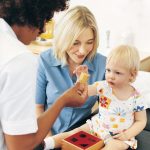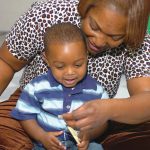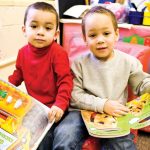Healthy social and emotional development in young children depends on positive and nurturing relationships with the important adults in their lives. Relationships are the foundation for children’s social and emotional development and support and influence how they learn about the world around them.
Positive relationships also help build secure attachments between children and their primary caregivers. Children learn through everyday interactions with their caregivers, and it is these early experiences that help them build trust, security, compassion, and empathy. These important interactions are described as the “social dance” between children and caregivers, and provide them with the first experiences in communication and emotional expression.1 These early experiences help children establish relationships with adults and peers, and help them learn about identifying, expressing, and managing emotions.
Children need to build trust in their caregivers in order to explore and learn. Caregivers help build this trust by being responsive and consistent in meeting children’s needs. These sensitive responses and interactions help children bond with and form secure attachments with their primary caregivers. In early infancy, children rely entirely on these caregivers to meet their basic emotional and physical needs. Emotionally available and responsive caregivers provide young children with feelings of security and predictability, and support children in co-regulating their emotions. This co-regulation is important in helping children learn to identify and manage their own emotions in the future. Therefore, it is important for caregivers to be sensitive to children’s needs when responding, and engage in genuine interactions that are affectionate and nurturing.
Children begin to recognize that they are separate from their caregivers between six and nine months of age.2 This new self-awareness is the very beginning of self-concept and empathy, as children start to recognize their own feelings. Children, in the context of their attachment relationships, express their emotions in a more appropriate and effective manner. As children get older, they are able to understand and respond to the feelings of others, a skill that is needed for positive social relationships. Children continue to rely on caregivers to have their basic needs met and to help regulate their emotions. They also use their caregivers for reassurance, guidance, and cues on how they should act and feel within their social and cultural contexts. Children practice these new social skills through communication, creative expression, and play.
The early relationships between children and primary caregivers are very special, but they are not always perfect. Children are born with their own temperament, which is their unique way of thinking, behaving, and reacting. Children’s temperament may be different from their caregivers’; therefore it is important that children have a “goodness of fit” with their caregivers to support healthy emotional development.3 Not all needs and interactions will be met or handled smoothly; this is often described as a mismatch between children and caregivers. Children can emotionally recover and reconnect with their caregivers when these mismatches are repaired in a positive manner. Mismatch and repair is common and part of normal social and emotional development.4
Notes
- Class Lecture, Erikson Institute (2002). Course: Human Development 1. Frances Stott, Ph.D. Chicago, IL.
- Stern, Daniel (1985). The interpersonal world of the infant. New York: Basic Books.
- Stern, Daniel (1985). The interpersonal world of the infant. New York: Basic Books.
- Tronick, E. & Gianino, A. (1986). Interactive mismatch and repair: Challenges to the coping infant. Zero to Three, 6(3), 1–6.


 Printer-friendly PDF
Printer-friendly PDF





 Printer-friendly PDF
Printer-friendly PDF